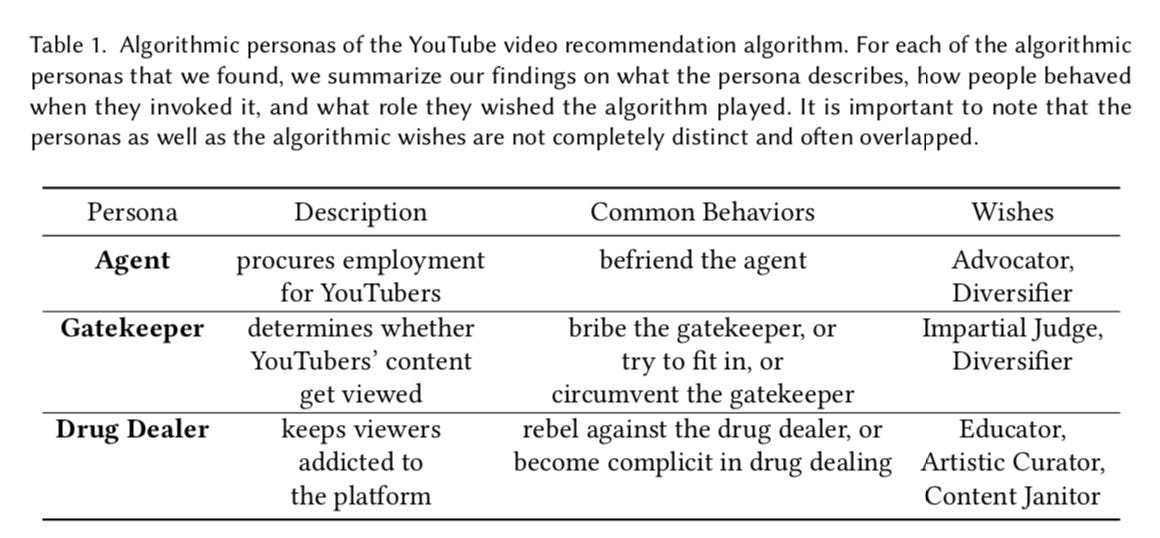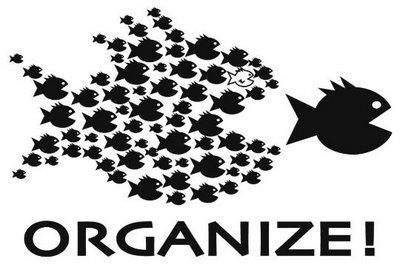Winning over the algorithm
Rather than winning over the audience
I’ve been thinking more about the easy things we can do to support small creators on the Internet.
These are people producing content and culture to a relatively small audience. Usually the size of that audience is not a reflection of the quality of their content, or their dedication, but rather their relationship with algorithms.
We take for granted the extent to which algorithms act as intermediaries and gatekeepers of culture. While this is a subject we cover frequently, I still find myself forgetting or underestimating their role.
That’s certainly been true as I’ve been exploring Twitch, however this has only heightened my awareness of the dynamic between creator and (recommendation) algorithm.
Increasingly I find myself recognizing the value of engagement. That a comment, like, or follow can really mean a lot to a small creator. Like a signal from the universe that they’re on the right track.
More than just a random act of kindness, what if helping the small creator by engaging with their content is a kind of moral imperative? A social responsibility we should be practicing regularly?
Kind of like wearing a mask in a pandemic, we should like a post or ask a question (via the comments) whenever we find or use knowledge online.
I’ll admit I’m a lurker by default. I prefer the anonymity afforded by the Internet and enjoy being able to gather and absorb knowledge privately. Yet there’s a deeper sense that this is kind of parasitic, and undermines the social responsibility I have with regard to our knowledge commons.
Which is why I want to make an effort, not so much a resolution (because those are meant to be broken), to show more gratitude and support to small creators. Specifically in the form of helping them with their struggles against the algorithm.
Agent, Gatekeeper, Drug Dealer: How Content Creators Craft Algorithmic Personas https://t.co/ncTA17GZnv v. @_eva_wu pic.twitter.com/nu3uznbwpR
— CCCB Lab (@CCCBLab) December 2, 2019
When the YouTube algorithm promotes a video, what role is it taking on in the social world? An influencer? A talent agent? An employer?
This question is central to understanding human-AI relationships, power dynamics, and potential accountability mechanisms. One group with a unique vantage point into this question are YouTube content creators (YouTubers). Over the past decade, YouTubers have created online and in-person communities that they use to share tips and engage in mutual aid and collective sense-making around understanding and making use of the platform. This collective sense-making is challenging because YouTubers do not have direct access to the technical aspects of the algorithm. At the same time, they do interact directly and intimately with the algorithm and its socio-technical infrastructure on the ground and have high stakes involved. We sought to learn YouTubers’ understandings, priorities, and wishes as they relate to the algorithm.
We found that YouTubers assign human characteristics to the algorithm to explain its behavior; what we have termed algorithmic personas. We identify three main algorithmic personas on YouTube: Agent, Gatekeeper, and Drug Dealer.
The concept of algorithmic personas are powerful not just because they foster algorithmic literacy, but also because they encourage us to imagine who is responsible. While the algorithm itself may not technically be a “who” by giving it a persona, we imagine the people who are ultimately responsible, the designers and executives behind or benefitting from it.
Although in this instance I find algorithm as drug dealer particularly apt. Especially given what we’ve learned about the role of dopamine in emphasizing engagement and prolonged screen time.
An Agent manages and helps the creator in their work by finding an audience for them and promoting them. A Gatekeeper stands between the creator and viewers and decides who gets through. A Drug Dealer has one (often nefarious) goal: keeping viewers hooked on the platform for as long as possible. YouTubers use these personas to make sense of actions that the algorithm takes and to orient themselves towards the algorithm or sometimes to work against it.

Algorithmic personas is a conceptual framework that is closely related to prior research on social media folk theories and algorithmic imaginaries. Algorithmic personas focus on the roles that algorithms take on in the social world and rely heavily on existing, familiar roles as guidance.
In this work we focus on how YouTubers craft algorithmic personas and how they use that understanding to devise strategies to work-with or work-against the algorithm.
If you watch YouTube for long enough you start to pick up on the peculiar and particular lexicon or vocabulary that has almost all creators compulsively imploring their viewers to hit the like button, subscribe and press the bell for notifications. This becomes so pervasive that I suspect many tune it out, yet as someone who studies algorithms and their social effects, I find it consistently glaring.
As I am now actively exploring Twitch, I’m looking for and finding different algorithmic affectations that are designed to facilitate a collaboration between humans to make machines happy. To satisfy algorithmic requirements in the hopes that it will then lead to an audience of like minded people who will respond with enthusiastic support.
Although is all of this comparable to a lottery and in essence a tax on the stupid, or in this case an opiate for the masses? I’m not so sure, in no small part as there are a growing number of instances of people profiting from their ability to outsmart or at least understand the algorithm.
Could this be done via personalization as described above? Or via straight up charm and brute force?
Latest collab with @Lucas_Shaw: we talked to the internet's constant hitmaker @MrBeastYT https://t.co/01tUQ1fdGS
— Mark Bergen (@mhbergen) December 22, 2020
In the fall of 2016, Jimmy Donaldson dropped out of college to try to solve one of the biggest mysteries in media: How exactly does a video go viral on YouTube? Donaldson, then 18, had been posting to the site since he was 12 without amassing much of an audience. But he was convinced he was close to unlocking the secrets of YouTube’s algorithm, the black box of rules and processes that determines what videos get recommended to viewers.
In the months that followed, Donaldson and a handful of his friends tried to crack the code. They conducted daily phone calls to analyze what videos went viral. They gave one another YouTube-related homework assignments, and they pestered successful channels for data about their most successful posts. “I woke up, I studied YouTube, I studied videos, I studied filmmaking, I went to bed and that was my life,” Donaldson recalled during a recent interview.
Then, one day, he was struck with an idea for a video that he was sure would work. It was as simple as counting. Donaldson sat down in a chair and, for the the next 40-plus hours, murmured one number after the next, starting from zero and continuing all the way to 100,000. At the end of the exhausting stunt, he looked deliriously at the camera. “What am I doing with my life?” he said.
There’s a certain level of truth to that moment of existential doubt, yet tragically such moments of philosophy are lost in larger attempts at fame, albeit successful in this instance.
It was an oddly mesmerizing performance, the kind of thing every kid in elementary school thinks about but never tries. The resulting video — entitled “I COUNTED TO 100000!” — was a viral smash. Since its debut on Jan. 8, 2017, it has earned over 21 million views.
The video helped give rise to one of the unlikeliest success stories on YouTube. Over the past four years, Donaldson‘s channel, MrBeast, has amassed more than 48 million subscribers. In the last 28 days, people have spent more than 34 million hours watching his videos. On Dec. 12, MrBeast was named Creator of the Year at the Streamy Awards, YouTube’s equivalent of the Oscars.
The consistent success of MrBeast’s videos has gotten the attention of the YouTube establishment. Last year, every video he posted eclipsed 20 million views. Such consistency is unparalleled, even among YouTube’s biggest stars. “He lives on a different planet than the rest of the YouTube world,” said Casey Neistat, a filmmaker turned YouTuber.
If this is the first you are hearing of MrBeast than I encourage you to take a brief moment to scope him out, if only because he is the current reigning champ of YouTube. Following in the footsteps of PewDiePie, MrBeast is likely to have a relatively long reign, well, until the next kid figures out how to beat the algorithm.
What I find fascinating about MrBeast, and similar champions of social media, is that their ability to win in the cultural industries foreshadows how others will win in the political sphere.
Attention is the end that is justified by any means, and increasingly that end involves winning over (or gaming) an algorithm.
What’s particularly interesting about MrBeast, is what he’s doing to stay on top of the algorithm, in this case, YouTube. He’s spending money. Ridiculous amounts of money.
Which is partly why I draw the politics analogy. Do anything to get the attention, and then spend what you get to keep the attention. Crass, but effective?
What is the end result of this process? A monoculture?
More on monoculture: https://t.co/pdIRPJvnY0 via @inputmag
— Brooke Erin Duffy (@brookeerinduffy) January 3, 2021
By now, you should be well aware you are a carrier of The Algorithm.
But don't feel bad. Most of us got ourselves were infected without realizing it. Over three-quarters of all Americans are now contaminated — 246 million touched by the Pox of Recommended Viewing.
Despite being a strong contender for one of streaming entertainment's worst value propositions, Netflix saw an unsurprising surge in membership subscriptions since lockdowns began in March. It’s far from the only company seeing that kind of unprecedented boom. According to Nielsen, Americans streamed 81.7 billion minutes of content during the second quarter of 2019. That same timespan for 2020? A staggering 142.5 billion minutes — a nearly 75 percent increase in the already incomprehensible amount of our finite time we give these services.
At a time when online privacy concerns are front and center in our daily cultural and political discussions, many of us are nonetheless perfectly content to hand over detailed information about our preferences, viewing habits, and the narratives about ourselves we like to see reflected back at us, all in exchange for another season of The Mandalorian.
It was always a longshot, but whatever possibility we had of defeating the Algorithm's cultural saturation disappeared during the past year's need for escapism from all the self-quarantines, work-from-home orders, and unemployment filings.
An argument that flirts with hyperbole but nonetheless rings true. Not just culturally. Think about how much more Amazon understands not just the economy but consequently our entire lives.
However concerns about privacy may be minor in the face of narrative and culture, which on a larger scale set our attitudes and relationship with privacy and other social values.
While Amazon may know much about us, Netflix does as well. They may have the lead or head start when it comes to anticipating what stories we’ll curl up with at night.
Perhaps we never truly stood a chance against the Algorithm's take-over of the American entertainment industry. In 2013, much ado was given to Netflix's House of Cards for openly touting itself as one of the first series to owe its existence almost entirely to Big Data.
According to the late David Carr, writing that year for The New York Times, Netflix "already knew that a healthy share had streamed the work of Mr. [David] Fincher, the director of The Social Network, from beginning to end. And films featuring [Kevin] Spacey had always done well, as had the British version of House of Cards. With those three circles of interest, Netflix was able to find a Venn diagram intersection that suggested that buying the series would be a very good bet on original programming."
And it was. Five more seasons and one long-overdue#MeToo scandal later, House of Cards wrapped up its melodrama of diminishing returns in late 2018. But Netflix did anything but cancel its data harvesting. Stranger Things, The Crown, Selina: The Series, even the ironically successful The Social Dilemma — all titles almost certainly conceived, tailored, green-lit, and/or acquired based on literally billions of data points concerning our recorded preferences, streaming habits, and recommendation ratios.
It’s hard for small creators to compete with this scale and the growing pseudo magic of machine learning.
And even Netflix (and Disney) face growing competition from the behemoth Amazon, who are not only competing with Prime Video (which produces original content a la Netflix) but also Twitch. In this context Amazon has a platform for Hollywood and a platform for user generated content (a/k/a where future talent will emerge).
For audiences these are exciting times, even if their relationship with the algorithms remains unquestioned and uncritical. For creators however these are stressful times, albeit still fueled by excitement.
It does however make sense that we spend a bit more time talking about the algorithms, and their influence on our culture.
Obviously this is a recurring subject of this newsletter, but I also think it is something we need to raise in our own environments. At dinner tables and in group chats.
For myself it’s a renewed commitment to acknowledge the algorithm when I enjoy content created by an aspiring or small producer. To press that like button, to post a comment, or just give them a word of encouragement. It may not be much, but in a world where the algorithm is overlord, it can often make a real difference.


